Name: 22222222222222222222222222 Teil 11,7 — Was ist in der
advertisement
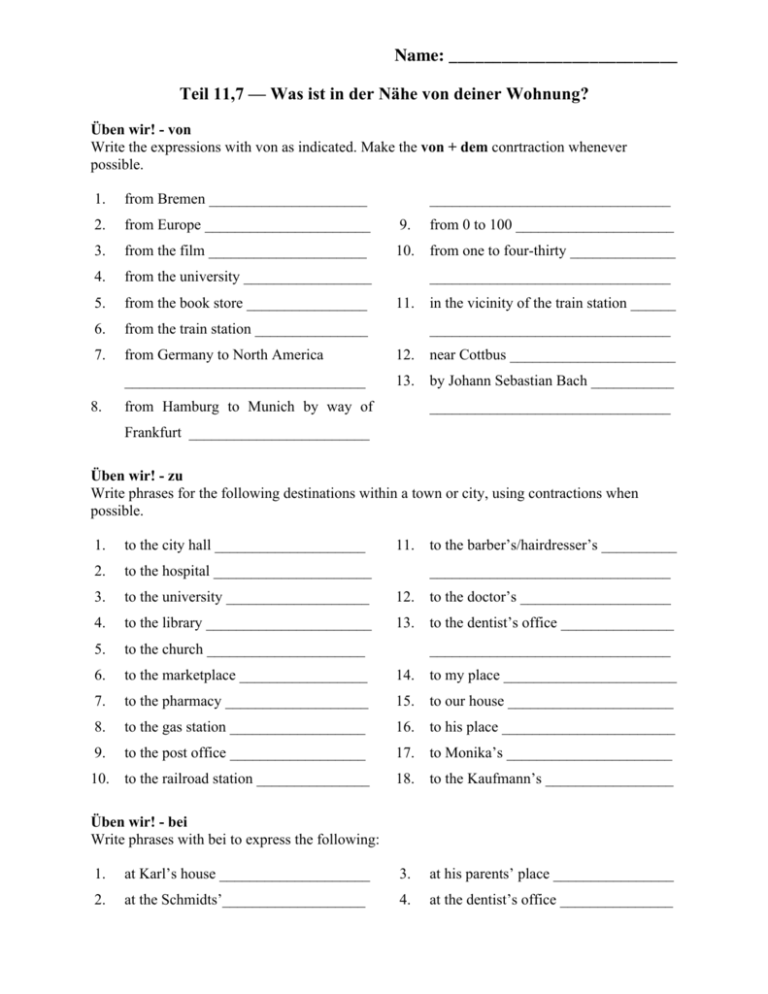
Name: __________________________ Teil 11,7 — Was ist in der Nähe von deiner Wohnung? Üben wir! - von Write the expressions with von as indicated. Make the von + dem conrtraction whenever possible. 1. from Bremen _____________________ 2. from Europe ______________________ 9. from 0 to 100 _____________________ 3. from the film _____________________ 10. from one to four-thirty ______________ 4. from the university _________________ 5. from the book store ________________ 6. from the train station _______________ 7. from Germany to North America 12. near Cottbus ______________________ ________________________________ 13. by Johann Sebastian Bach ___________ 8. ________________________________ ________________________________ 11. in the vicinity of the train station ______ ________________________________ from Hamburg to Munich by way of ________________________________ Frankfurt ________________________ Üben wir! - zu Write phrases for the following destinations within a town or city, using contractions when possible. 1. to the city hall ____________________ 11. to the barber’s/hairdresser’s __________ 2. to the hospital _____________________ 3. to the university ___________________ 12. to the doctor’s ____________________ 4. to the library ______________________ 13. to the dentist’s office _______________ 5. to the church _____________________ 6. to the marketplace _________________ 14. to my place _______________________ 7. to the pharmacy ___________________ 15. to our house ______________________ 8. to the gas station __________________ 16. to his place _______________________ 9. to the post office __________________ 17. to Monika’s ______________________ 10. to the railroad station _______________ 18. to the Kaufmann’s _________________ ________________________________ ________________________________ Üben wir! - bei Write phrases with bei to express the following: 1. at Karl’s house ____________________ 3. at his parents’ place ________________ 2. at the Schmidts’___________________ 4. at the dentist’s office _______________ 5. at the bank _______________________ 6. at the hairdresser’s _________________ Kontrolle Fill in the blanks with information you have learned in this Teil. 1. To designate the starting point of a trip of departure use the preposition ______________. 2. Its usual equivalent in English is __________. 3. When you use this preposition with dem, you normally contract it to __________. 4. To elicit information about the starting point of a trip or departure, you use the question word __________. 5. Quite often you will mention the destination of a trip as well as its starting point. You would expect to have two prepositional phrases in back-to-back position. The first one is introduced by __________, the second by __________. 6. If you indicate a stopover, layover, or transfer point, you would use the preposition __________. 7. To mention a starting point, intermediate point, and the destination in one sentence, you need to use the three prepositions __________...__________...__________. 8. To express a range of numbers or a span of time you may use von along with __________. 9. To indicate that something is nearby, in the vicinity of, or not far from another location use the expression ____________________________. 10. You may also use von to indicate the __________________of a book or a film. 11. If you wish to inquire about the authorship of something, use the interrogative expression __________________________. 12. To supply information that answers the question whose?, use the preposition ______ plus a name or a dative pronoun. 13. To designate a destination within a village, town, or city, you use the dative preposition ______. 14. Like nach, it is rendered in English as _______. 15. This preposition contracts with dem producing the form ______. 16. It also contracts with the feminine article der, producing the form ______. 17. You may use the preposition zu to designate that a destination is someone’s house. The object of the preposition in this case is a __________. 18. Do you use the word Haus when you designate someone’s residence as a destination? _____ 19. You may also use the preposition zu with the verb gehen to indicate that you are a __________ of a group, church, or organization. 20. When discussing events that happen on a holiday or during a holiday season, speakers of English use on (on Thanksgiving) or for (for Passover). Speakers of German use _______. 21. To designate a location such as a residence, office, or shop at which someone or something is situated, use the preposition ________. 22. It contracts with dem to form _______. 23. To indicate that the subject has something in its possession or on its person, use the preposition bei with a ______________ pronoun. 24. Instead of using a wenn-clause, you may use the preposition bei to formulate phrases about the __________. Üben wir im Kontext Situation I: You are talking to your travel agent about going to different places in Europe. Write down your questions as suggested. 1. Ask if you have to fly from Houston by way of London to Brussels… _________________________________________________________________________ 2. …or if you can go directly from Houston to Paris. _________________________________________________________________________ 3. Tell the agent that you want to take the train from Brussels to Frankfurt. _________________________________________________________________________ 4. Ask her if many people take this train from June to September. ________________________________________________________________________ Situation II: You are visiting Zürich and want to find out where things are. Write down what you would ask the person at the tourist information counter at the train station. Model: the market Wie komme ich zum Markt, bitte? 1. the university _____________________________________________________________ 2. the museum ______________________________________________________________ 3. the theater ________________________________________________________________ 4. a hotel near the center of town ________________________________________________ Situation III: You have received information about the city and are now exploring it. Some things still aren’t easy to find. You need to get help from passers-by. Using the Können Sie mir sagen,… formula, write questions to find out how to get to: 1. a bookstore _______________________________________________________________ 2. the city park ______________________________________________________________ 3. the post office _____________________________________________________________ 4. a restaurant _______________________________________________________________ 5. the city hall _______________________________________________________________ Situation IV: Eva has returned from shopping and running errands and her mother asks where she has been. Write down what Eva and her mother say. 1. She wants to know if Eva was at the public library… _________________________________________________________________________ 2. …and if she bought bread at the baker’s. _________________________________________________________________________ 3. She also wants to know if she had enough money with her. _________________________________________________________________________ 4. Eva tells her mother that she came back late because she drank some tea at Bärbels’. ________________________________________________________________________ Paraphrasing. Revise the sentences by substituting a bei-phrase for the part of the sentence in italics. 1. Wenn das Wetter schlecht ist, bleiben wir zu Hause. _________________________________________________________________________ 2. Wenn das Wetter gut ist, machen wir einen Spaziergang. _________________________________________________________________________ 3. Wenn es neblig ist, muss man langsamer fahren. _________________________________________________________________________ 4. Die Dörfer Osterscheps und Westerscheps sind in der Nähe von Edewecht. ________________________________________________________________________ Du bist dran! Write complete answers to each of the following questions. (Pay attention here not only to the dative prepositions in your responses, but to the use of man in some of the questions. Remember man is not du.) 1. Wohin geht man, wenn man Bücher leihen will? ________________________________________________________________________ 2. Wohin geht man, wenn man mit dem Zug reist? ________________________________________________________________________ 3. Wohin fährt man, wenn man fliegt? ________________________________________________________________________ 4. Wohin geht man, wenn man Medikamente braucht? ________________________________________________________________________ 5. Was machst du, wenn den Auto wenig Benzin hat? Wohin gehst du? ________________________________________________________________________ 6. Wohin gehst du, wenn du Zahnschmerzen haben? ________________________________________________________________________ 7. Bei wem wohnst du jetzt? ________________________________________________________________________ 8. Was habst du jetzt bei dir? ________________________________________________________________________ 9. Was machst du gern bei kaltem Wetter? ________________________________________________________________________ 10. Was ist bei Ihrer Universität? ________________________________________________________________________
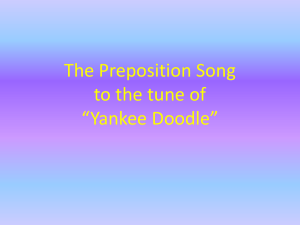
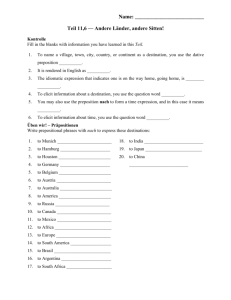
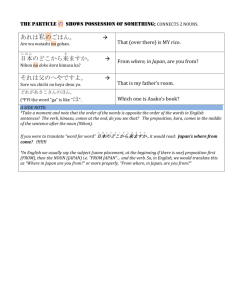
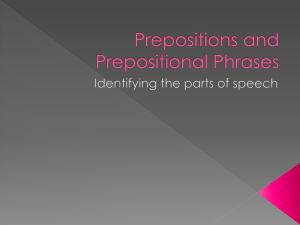
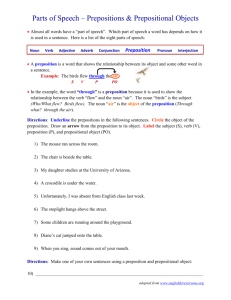
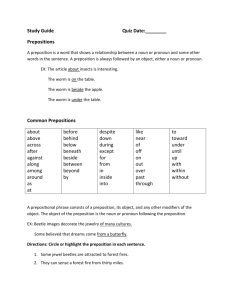
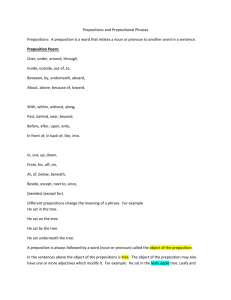



![succeed in ([doing] something)](http://s3.studylib.net/store/data/007092191_1-44cde08e787284f3fdfa01713016d562-300x300.png)